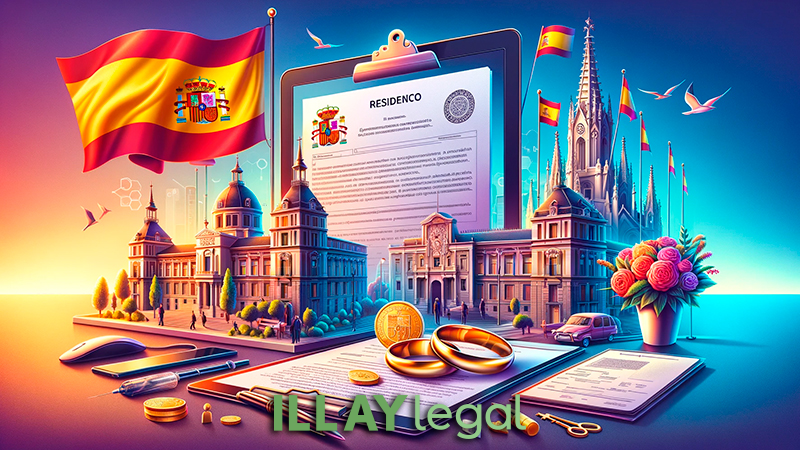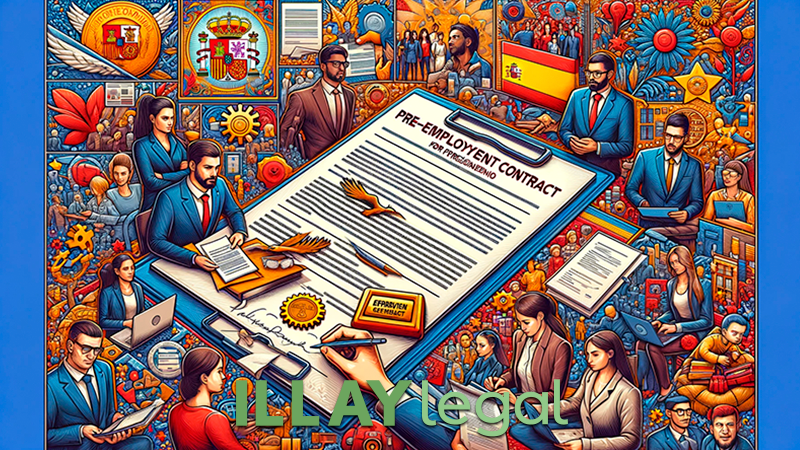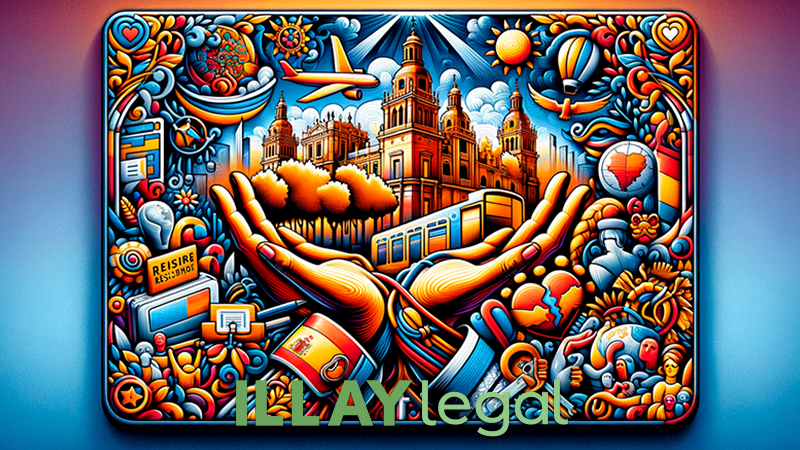
Marrying a Spanish citizen or a citizen of the European Union is not only a commitment of love and shared life; it also represents a legitimate and effective way to start a new chapter in Spain.
This detailed guide will accompany you every step towards obtaining Spanish residency through marriage, combining love and legality in a clear and structured process towards your new life in one of the world’s most welcoming and culturally rich countries.
If you want to know how to obtain residency in Spain through marriage, you are in the perfect place at the right time. Shall we begin?
Table of contents:
Do you want a expert consultation? Contact us and we will help you.
Introduction to Residency Through Marriage in Spain
Marriage opens more than just an emotional chapter in our lives; in the context of migration, it can be the key to new opportunities and experiences in foreign lands. In Spain, a country known for its warmth, diversity, and cultural richness, marriage to a national or member of the European Union is recognized as one of the most direct and secure paths to legal residency.
This introduction aims to unravel the process, simplify the requirements, and highlight the numerous advantages of opting for marriage as a bridge to residency in Spain, offering a clear and concise vision that will guide you towards success in this important procedure.
Why Marriage as a Gateway to Spanish Residency?
Marriage is considered a privileged route to residency for several fundamental reasons. First, it reflects a personal and legally recognized bond with a citizen of the country or of the European Union, providing a solid foundation for the residency application. This marital link not only symbolizes the union of two people but, from a legal perspective, establishes a mutual commitment to support and sustenance that the Spanish state values and respects.
Moreover, marriage to a Spanish citizen or an EU member opens access to rights and privileges similar to those of the citizens themselves, including the possibility to work and live in the country. Spanish law facilitates this process by considering that marriage is a demonstration of social integration and commitment to life in Spain, thus offering an expedited route to residency.
Opting for marriage as a path to residency is not only an act of love and personal commitment but also an effective legal strategy that aligns your dreams of a life in Spain with a solid legal basis. It is an opportunity to start a new life together, enjoying everything this sunny country has to offer, from its rich culture and history to its delicious cuisine and stunning landscapes.
This approach to residency through marriage is widely recognized and respected in Spain, facilitating international couples the possibility to build their future together within a framework of legal security and cultural acceptance. By considering marriage as your bridge to Spain, you embark on a journey not just towards personal union but towards a new stage of opportunities and growth in one of Europe’s most charming destinations.
First Steps to Obtain Spanish Citizenship by Marriage
Embarking on the process of residency in Spain begins with a significant decision: civil marriage. This commitment not only unites two people in a bond of love and mutual respect but also establishes a legal basis for residency in Spain. Choosing to marry opens a direct path to a new life together in this country full of opportunities.
Civil Marriage as the Gateway
Civil marriage is a legal procedure recognized as one of the safest and most direct routes to obtaining residency, emphasizing the need for the relationship to be genuine and founded on real commitment. Spanish law closely examines the authenticity of the marital relationship, ensuring that it is not a marriage of convenience solely for obtaining migration benefits.
It is crucial to understand that civil marriage is the starting point in the residency application process, marking the beginning of a series of legal procedures that will culminate in the acquisition of Spanish residency for the foreign spouse. This path begins with the marriage celebration before the competent authorities and the registration of this in the Civil Registry, acts that legally validate the union and enable the foreign spouse to initiate their residency application in Spain.
Do you want a expert consultation? Contact us and we will help you.
Navigating the Legal Process of Marriage in Spain
Once the civil marriage has been established, it is crucial to navigate the legal process with precision and attention to detail. Residency in Spain by marriage involves a series of requirements and documentation that must be met and presented properly.
Requirements and Eligibility for the Residency Card by Marriage
To be eligible for the residency card by marriage, the first step is to demonstrate the marital bond with a Spanish citizen or a member of the European Union. This bond must not only be legal but also real and ongoing, showing that the couple shares a life together. Additionally, it is essential that the Spanish citizen or EU member demonstrate sufficient economic means to support the foreign spouse, ensuring that they do not become a burden on the Spanish state. This economic solvency requirement reflects the need for financial stability that allows both spouses to live dignifiedly in Spain.
Necessary Documentation and Application Process
The application for a NIE (Foreigner Identification Number) by marriage is the first formal step towards residency in Spain. This application requires a specific list of documents that prove both the relationship and the couple’s capacity to sustain themselves in the country. The essential documents include:
- Valid passport of the foreign spouse.
- Marriage certificate, proving the legal union.
- Joint registration certificate, demonstrating cohabitation.
- Spanish citizen’s DNI or EU citizen registration certificate.
- Proof of economic sufficiency, such as pay slips, employment contracts, or bank statements.
This set of documents, along with the appropriate application form and the payment of the corresponding fees, must be presented at the competent Foreigners’ Office. The process from marriage registration to obtaining the residency card involves several steps, including the possible need for an interview and the verification of documents by the authorities.
Navigating this legal process requires patience, attention to detail, and often, the guidance of experts in the field. Clarity and preparation at each stage can make the difference between a smooth experience and one filled with obstacles. With the correct documentation and a clear understanding of the requirements, the path to residency in Spain through marriage can be an exciting and rewarding transition to a new chapter in life.
Key Aspects to Consider
Once the step towards marital union has been taken and the residency application process begins, there are certain key aspects that should not be overlooked. One of the most important is continuous and transparent communication with the authorities.
Notification of Change in Circumstances
Keeping the information provided to the Foreigners’ Office up-to-date is crucial throughout the residency application process. Any significant change in personal circumstances, such as a change of address, marital status (for example, divorce or annulment of the domestic partnership), change of nationality, among others, must be notified within the legally stipulated timeframe, which is generally one month from the occurrence of the change.
Failure to comply with this obligation can have negative consequences for the applicant, including the possible extinction of the residency permit with retroactive effect. This step is not only a legal requirement but also demonstrates to the state the seriousness and responsibility with which the applicant approaches their stay in the country. Transparency and compliance with these requirements are fundamental to maintaining a good relationship with immigration authorities and ensuring the continuity of the residency process in Spain.
Broadening the Horizon: Beyond Marriage
Marriage to a Spanish citizen or an EU member is one of the clearest paths to residency in Spain, but it is not the only one. There are other ways to establish a life in Spain through family ties, which can also provide a solid basis for the residency application.
Other Options for Residency in Spain
For those looking for alternatives to marriage, Spain offers various options that recognize and value other types of unions and family bonds. These include:
- Registered domestic partnership: Similar to marriage in rights and obligations, this option is for couples who do not wish to marry formally but want to establish their union legally.
- Unregistered or stable domestic partnership: Although it requires more effort to prove the relationship to the authorities, it can also be a path to residency.
- Family ties with Spanish citizens or EU members: Even without a marriage or domestic partnership, certain family ties can facilitate the residency process.
It is essential that these relationships be genuine and not established solely for the purpose of obtaining migration benefits. Spanish authorities conduct investigations to confirm the authenticity of the relationships, and only those that are considered real and effective will be valid for residency procedures.
Conclusions and Final Advice
At the end of the road to residency in Spain through marriage, it is essential to look back and recognize the importance of each step taken. This process, although sometimes complex, is a gateway to a new beginning in a country full of culture, history, and human warmth.
Recommendations for a Successful Process
To successfully navigate this process, careful preparation and a deep understanding of all the requirements and procedures are crucial. Here are some final tips:
- Organization: Keep all your documents and proofs of the relationship well organized and accessible.
- Updated Information: Ensure you are aware of any changes in legislation or application requirements.
- Professional Assistance: Consider seeking help from immigration law professionals, such as IllayLegal, who can provide guidance and support throughout the entire process.
- Patience and Positivity: Maintain a positive attitude and be patient. Waiting times and bureaucracy are part of the process, but the end result is worth it.
Obtaining residency in Spain through marriage is a journey filled with learning and experiences. With the right guidance, preparation, and a positive approach, you can transform this process into the beginning of an exciting new life in Spain.
Do you want a expert consultation? Contact us and we will help you.
Disclaimer: This article is for informational purposes only and may contain errors or be outdated. It does not constitute legal advice. For an updated and initial consultation, contact us. One of our expert attorneys will assist you.








